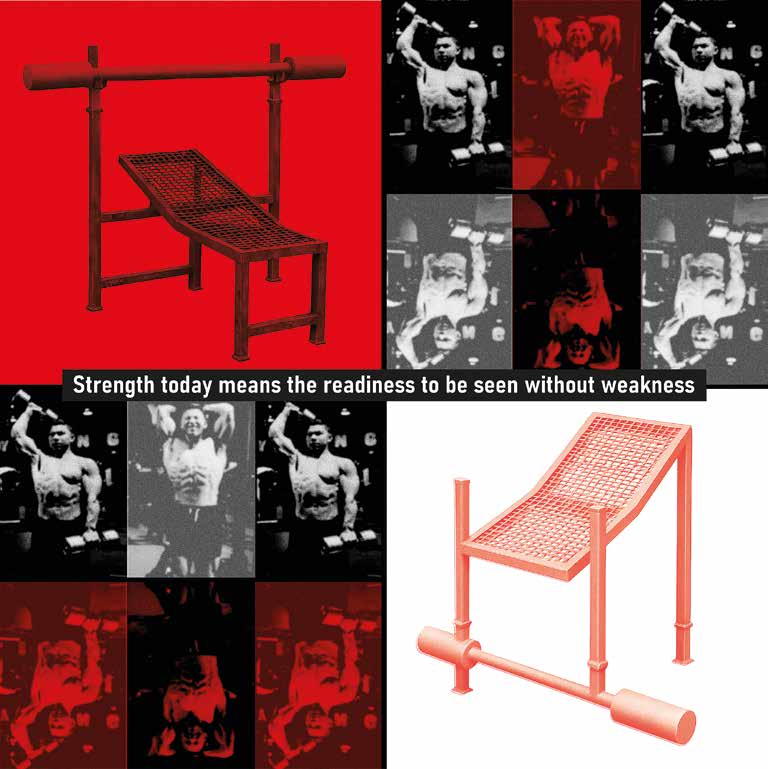Plac zabaw: od architektury dyscypliny do architektury wyczerpania
Der Spielplatz: von der Architektur der Disziplin zur Architektur der Erschöpfung
The Playground: From the Architecture of Discipline to the Architecture of Exhaustion
Artysta | Künstler | artist: Maciej Zdanowicz (1982)
miejsce | Ort | place: Galerie B, Projektraum Słubfurt , Lindenstraße 4, 6, Frankfurt (O)
Projekt bada przemiany przestrzeni rekreacyjnych – od narzędzi dyscypliny i kontroli ciała w czasach socjalizmu po współczesne strefy regeneracji w społeczeństwie wyczerpania. Inspirując się teoriami Michela Foucaulta i Byung-Chula Hana, autor analizuje, jak architektura placów zabaw i siłowni odzwierciedla przemiany w podejściu do cielesności, zdrowia i produktywności. Od foucaultowskiej „mikrofizyki władzy” i pojęcia instytucji dyscyplinujących, przez hanowską diagnozę późnej nowoczesności jako epoki autoeksploatacji, projekt dotyka związków między architekturą, władzą i (dez)utopią zdrowia. Zdanowicz odwołuje się również do teorii przestrzeni liminalnych i miejsc wspólnotowej pamięci, w których ciało staje się areną przemian społecznych i ideologicznych. Projekt łączy badania terenowe, warsztaty z lokalną społecznością oraz tworzenie obiektów inspirowanych przestrzeniami gimnastyki i odpoczynku. Finałem jest Dziennik regeneracji – performatywny zapis codziennych ćwiczeń i zmiany stanu psychofizycznego artysty, publikowany online. Projekt stawia pytanie: czy regeneracja jest dziś rzeczywiście aktem wolności, czy kolejnym obowiązkiem w świecie przymusu doskonałości?
Das Projekt untersucht den Wandel von Erholungsräumen – von Instrumenten der Disziplinierung und Körperkontrolle im Sozialismus zu zeitgenössischen Zonen der Regeneration in einer Gesellschaft der Erschöpfung. Inspiriert von den Theorien von Michel Foucault und Byung-Chul Han analysiert der Autor, wie die Architektur von Spielplätzen und Turnhallen den Wandel der Einstellungen zu Körperlichkeit, Gesundheit und Produktivität widerspiegelt. Von Foucaults „Mikrophysik der Macht“ und dem Begriff der disziplinären Institutionen bis hin zu Hans Diagnose der Spätmoderne als Zeitalter der Selbstausbeutung berührt das Projekt die Beziehung zwischen Architektur, Macht und der (Un-)Utopie der Gesundheit. Zdanowicz bezieht sich auch auf Theorien über Grenzräume und Orte der gemeinschaftlichen Erinnerung, in denen der Körper zu einer Arena der sozialen und ideologischen Transformation wird. Das Projekt verbindet Feldforschung, Workshops mit der lokalen Gemeinschaft und die Schaffung von Objekten, die von Gymnastik- und Ruheräumen inspiriert sind. Den Abschluss bildet das Journal of Regeneration, eine performative Aufzeichnung der täglichen Übungen und des sich verändernden psychophysischen Zustands des Künstlers, die online veröffentlicht wird. Das Projekt wirft die Frage auf: Ist Regeneration heute wirklich ein Akt der Freiheit oder nur eine weitere Verpflichtung in einer Welt des Perfektionszwangs?
The project explores the transformation of recreational spaces — from tools of discipline and body control under socialism to contemporary zones of regeneration in a society of exhaustion. Inspired by the theories of Michel Foucault and Byung-Chul Han, the artist analyses how the architecture of playgrounds and gyms reflects transformations in attitudes to corporeality, health and productivity. From Foucault’s “microphysics of power” and the notion of disciplinary institutions, to Han’s diagnosis of late modernity as an age of self-exploitation, the project touches on the relationship between architecture, power and the (dis)utopia of health. Zdanowicz also refers to theories of liminal spaces and sites of communal memory, in which the body becomes an arena of social and ideological transformation. The project combines field research, workshops with the local community and the creation of objects inspired by spaces of gymnastics and rest. The final piece is The Journal of Regeneration, a performative record of the artist’s daily exercise and changing psycho-physical state, published online. The project poses the question: Is regeneration today really an act of freedom or just another obligation in a world of compulsion for perfection?

Przy wsparciu | Mit freundlicher Unterstützung | supported by
